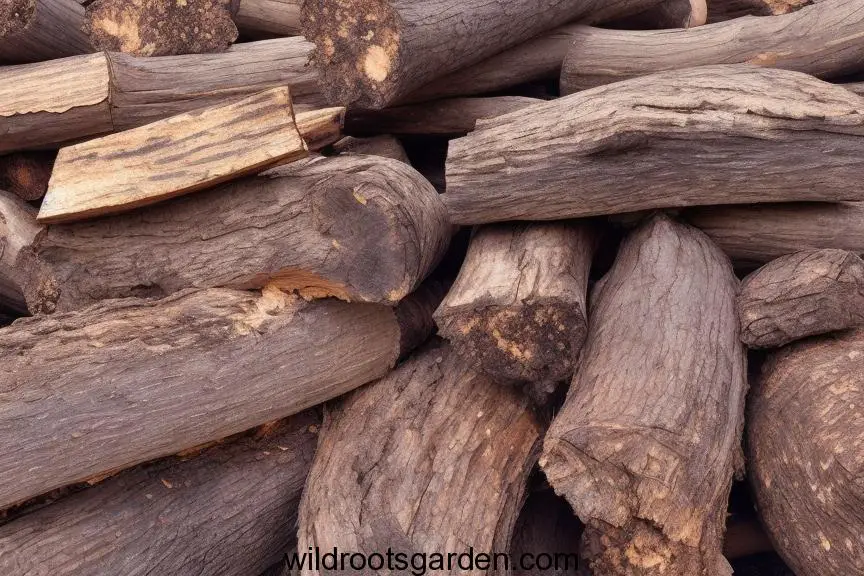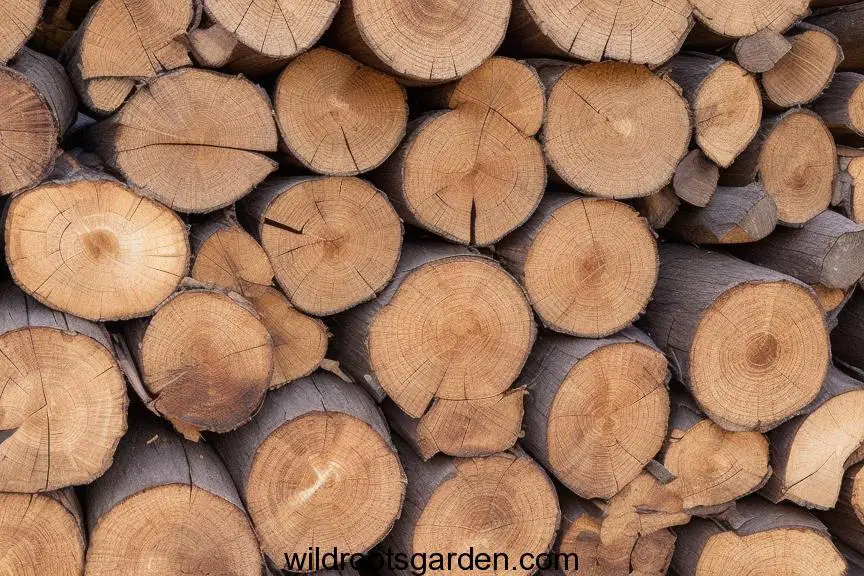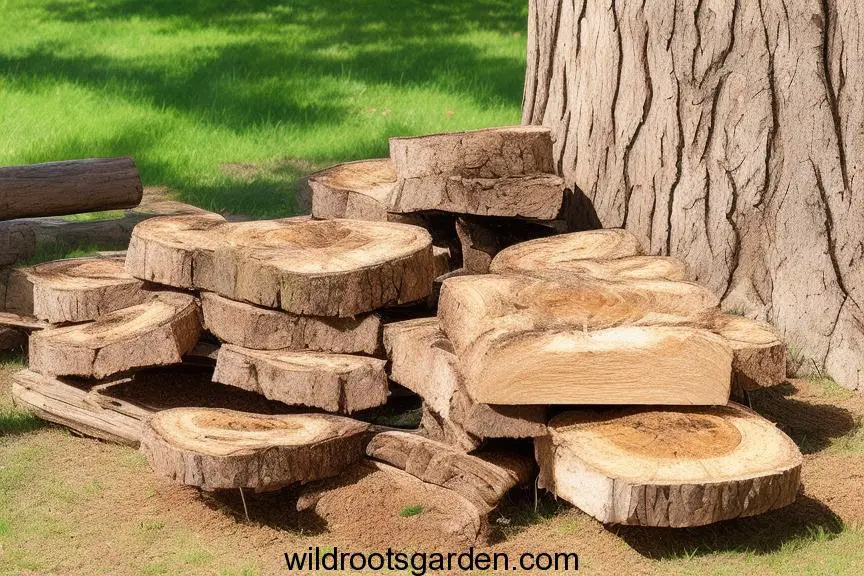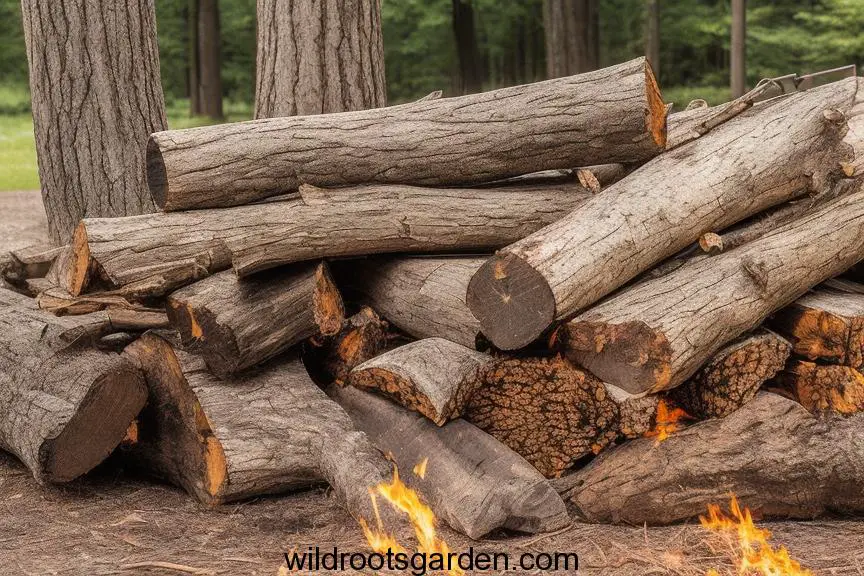Is Black Walnut Wood for Good Firewood? Black walnut firewood has surged in popularity owing to its remarkable heat output and efficient burn time. Its capacity to generate a robust flame has captured the attention of firewood enthusiasts seeking both warmth and ambiance. However, it’s crucial to comprehend the nuances of using black walnut firewood to ensure an optimal experience that keeps the flames ablaze.
Black walnut stands out as a standout option when it comes to firewood, thanks in large part to its widespread distribution across the geography of North America. Being so widespread makes finding high-quality firewood a simple task because black walnut trees can be found all throughout the continent. Let’s explore the many benefits of black walnut as a prime option for combustion in more detail, as well as several strategies to get the most out of your future campfire or outdoor hearth excursion.
JUMP TO TOPIC
- 1 Characteristics of Black Walnut Firewood
- 2 The Safety of Burning Black Walnuts in Your Fireplace
- 3 Optimal Seasoning Duration for Black Walnut Firewood
- 4 A Gradual Approach to Seasoning:
- 5 Why Slow Seasoning Matters:
- 6 Unlocking the Benefits of Black Walnut Firewood
- 7 A Superior Choice for Firewood:
- 8 FAQs
Characteristics of Black Walnut Firewood

Black walnut firewood possesses a distinctive set of characteristics that contribute to its popularity and efficacy as a heat source. Understanding these features can help you make informed decisions when utilizing black walnut wood for your fires.
High Energy Density: Black walnut firewood is renowned for its high energy density, which means it produces a significant amount of heat when burned. This characteristic makes it an excellent choice for efficiently warming indoor spaces and outdoor settings.
Efficient Burn Time: The dense nature of black walnut wood allows it to burn for an extended period without requiring constant replenishment. This efficiency in burn time makes it a convenient option for those seeking long-lasting warmth.
Abundant Heat Output: When ignited, black walnut firewood generates a substantial and consistent heat output. This can be particularly advantageous during colder months or when you need a potent heat source for activities like cooking or heating water.
Aromatic Fragrance: Burning black walnut wood emits a pleasant and distinctive aroma. The aromatic scent adds to the overall ambiance of your fire, enhancing the sensory experience and creating a cozy atmosphere.
Uniform Grain and Color: Black walnut wood typically boasts a uniform grain pattern and a rich, dark brown color. These visual attributes contribute to its aesthetic appeal, making it a sought-after choice for both functional and decorative fires.
Moderate Sparking: Compared to some other hardwoods, black walnut firewood tends to produce fewer sparks and embers. While no wood is entirely spark-free, the reduced sparking of black walnut can enhance safety during indoor or close-proximity fires.
Harvested Locally: Black walnut trees are prevalent across North America, making the wood readily available in many regions. This local availability can result in reduced transportation costs and a smaller carbon footprint for those who prioritize environmentally friendly choices.
Durable and Resilient: Black walnut wood is known for its durability and resistance to decay, which contributes to its longevity as firewood. This durability also makes it suitable for other woodworking and crafting projects.
Considerations for Smoke: While black walnut wood burns relatively cleanly, it’s worth noting that all firewood produces some level of smoke. Proper ventilation and chimney maintenance are essential to ensuring efficient smoke expulsion.
The Safety of Burning Black Walnuts in Your Fireplace

Having gained insights into the advantageous attributes of black walnut firewood, the question arises: Is it a safe choice for your fireplace? Delving into the safety considerations associated with utilizing black walnut wood in your hearth can ensure both a cozy ambiance and peace of mind.
A Secure Choice for Your Fireplace:
- Vigilant Monitoring: The cornerstone of safely burning any firewood, including black walnut, lies in vigilant monitoring. By maintaining a watchful eye on the flames and ensuring a consistent burn, you can mitigate potential issues and enjoy a secure fire experience.
- Adaptability to Fireplaces: Black walnut wood can be safely burned in a home fireplace. Its dense composition and efficient burn characteristics make it suitable for indoor use, provided you adhere to recommended practices for fire safety.
- Compatibility with Wood Stoves: If you prefer a wood stove for heating, rest assured that black walnut wood is compatible with this option as well. Its high heat output and extended burn time make it an excellent choice for wood stoves.
Know Your Local Regulations:
- Legal Considerations: While black walnut firewood is generally safe to use in a fireplace or wood stove, it’s crucial to understand the legalities surrounding firewood usage in your region. Check local regulations to ensure that burning black walnut wood is allowed without any restrictions.
- Permits and Licensing: In some areas, there might be specific regulations regarding the types of firewood you can burn. Depending on your locality, you might need a permit or license to burn certain types of wood, including black walnut. Ensure compliance with these regulations to avoid any legal complications.
- Outdoor Fire Pits: If you intend to use black walnut firewood in an outdoor fire pit, it’s advisable to check for any restrictions or guidelines. While it might be safe for indoor use, outdoor conditions can vary, and local regulations may differ.
Optimal Seasoning Duration for Black Walnut Firewood
Delving into the realm of black walnut firewood, it becomes evident that the journey of seasoning this hardwood is a nuanced process, distinct from that of other wood varieties. Understanding the intricacies of properly seasoning black walnut wood is essential to harnessing its impressive heat value and maximizing burn efficiency.

A Gradual Approach to Seasoning:
Unique Characteristics: Black walnut wood, with its elevated moisture content, demands a more patient seasoning approach compared to regular hardwoods. The wood cells’ higher moisture content necessitates a slow and deliberate drying process to achieve optimal combustion performance.
Seasoning Timeframe: To fully prepare black walnut firewood for its fiery role, a seasoning period of approximately 1 to 2 years is recommended. While other hardwoods may achieve readiness in a matter of months, black walnut requires an extended period of time for its moisture content to sufficiently decrease.
Air Drying Considerations: For wood pieces not exceeding 1″ in thickness, air drying can take about 3 to 6 months. However, it’s essential to acknowledge that this initial drying phase is merely a preliminary step toward achieving the desired moisture levels.
Why Slow Seasoning Matters:
Combustion Efficiency: Attempting to burn green-black walnut wood prematurely in your fireplace can result in suboptimal combustion. This leads to undesirable outcomes, including a pungent odor and the potential accumulation of hazardous carbon monoxide levels within your indoor environment or campsite.
Adequate Drying Time: Ensuring that any firewood, including black walnut, is seasoned for a sufficient period is paramount. Waiting for at least six months, if not longer, allows the wood’s moisture content to decrease significantly, leading to a safer and more efficient fire.
Long-Term Gains: Taking the time to season black walnut firewood appropriately can prevent future challenges and inconveniences. The efforts invested in thorough seasoning ultimately yield a rewarding fire experience marked by enhanced safety and sustained warmth.
Unlocking the Benefits of Black Walnut Firewood

In the realm of firewood choices, black walnut stands as an esteemed contender, revered for its exceptional attributes that contribute to an optimal fire experience. The merits of black walnut firewood extend beyond mere tradition; they are deeply rooted in its hardwood composition, igniting fires that burn slowly, radiate copious heat, and embrace an eco-friendly approach to combustion.
A Superior Choice for Firewood:
- Enduring Hardwood Qualities: Black walnut, a hardwood variety, takes center stage as an exceptional firewood option due to its inherent qualities. It’s slow-burning nature and robust heat production set it apart as an optimal choice for kindling fires that stand the test of time.
- The Trifecta of Excellence: Black walnuts encapsulate a triumvirate of attributes that elevate their stature as firewood logs:
- High Heat Value: When ignited, black walnut firewood unleashes a formidable heat output that envelops its surroundings in a cozy embrace. This high heat value ensures an efficient and potent source of warmth.
- Long Burn Time: The longevity of a fire is a coveted trait, and black walnuts shine in this regard. Their slow-burning nature extends the duration of fires, allowing for extended enjoyment without frequent replenishment.
- Minimal Smoke and Emissions: Black walnut firewood stands as a testament to eco-conscious combustion. Its low smoke and emissions profile contributes to a cleaner and more pleasant fire experience.
Comparative Brilliance:
- Elevated Burn Quality: When contrasted with other firewood types, black walnut wood emerges as a distinctive champion. Its higher heat output, prolonged burn time, and reduced emissions offer a superior alternative, ensuring an elevated fire encounter.
- Versatility in Applications: The merits of black walnut firewood transcend traditional heating purposes. Its attributes render it ideal for cooking fires and other applications that demand consistent and reliable heat production.
- Dense Durability: Black walnut’s inherent density adds to its allure as firewood. This density translates to prolonged endurance, making it a resilient choice that outlasts many other firewood varieties.
FAQs
Q1: Is Black Walnut wood suitable for use as firewood?
Black Walnut wood can be used as firewood, but it’s not the best choice due to its high density and potential for producing a lot of creosote buildup in chimneys. It can also emit a strong, distinctive odor when burned.
Q2: Does Black Walnut wood produce a lot of heat when burned?
Yes, Black Walnut wood does produce a good amount of heat when burned. Its high density contributes to a slow and steady burn, which can provide a decent heat output. However, there are other hardwoods that offer better heat output for firewood.
Q3: What are the drawbacks of using Black Walnut wood for burning?
Using Black Walnut wood as firewood has some drawbacks. It can be difficult to split due to its hardness, making it less convenient to handle. Additionally, the high amount of creosote it produces can lead to chimney buildup, increasing the risk of chimney fires.
Q4: Is it safe to burn Black Walnut wood in a fireplace or wood stove indoors?
While it is technically safe to burn Black Walnut wood indoors, there are some considerations to keep in mind. The wood’s strong odor when burned might not be pleasant in enclosed spaces. Moreover, the creosote buildup it generates can pose a chimney fire hazard if not cleaned regularly.
Q5: How should Black Walnut firewood be seasoned before use?
Proper seasoning is important for any firewood, including Black Walnut. It’s recommended to let the wood dry and season for at least 6-12 months to reduce its moisture content. This will improve its burn efficiency and minimize the production of excessive smoke and creosote.


